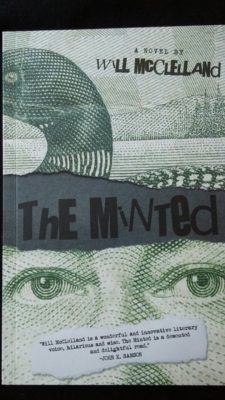Will McClelland’s self-published debut novel The Minted is set in a surreal futuristic Canada, where animals talk and the country is under the control of a shadowy villain named Argent. The story takes place during “The Great Burning” of the early 2030s, when an uprising of wild animals, led by an immortal moose, briefly cripples the infrastructure of the nation’s cities and towns. A mash-up of the paranoid speculative fiction of Philip K. Dick and a profanity-laced episode of Hinterland Who’s Who, the book is a uniquely Canadian take on dystopia.
The novel begins with a note from the book’s fictional editor, Nicholas A. Cibiades. Thirty years after the animal rebellion, he explains how he first encountered the notorious talking moose – known variously as The Original, the Great Black Beast, and Ollie – in the wilds of north-western Saskatchewan. Fresh from escaping the RCMP, who held him captive in a Via Rail car, the moose was on the run and took Nicholas as his unlikely travelling companion.

The Minted
Will McClelland
Blue Leaf Press
$20.00
paper
180pp
9780991873807
The moose’s writing style is polemical. He views himself as a political prisoner, explaining what motivated his violent actions. The animal rebellion, he reveals, was primarily an effort to depose Argent, an immortal French aristocrat who, in this alternative account of Canadian history, is behind every major capitalist development from the fur trade to the railroad and beyond. The country’s wild animals were fighting back against the despoliation of the northern hinterlands and wresting power from the citizens of “downtown Canada.”
Writing from the Mint, Marianne gives us further insight into Argent’s dark reign and reveals the members of his inner circle, made up of several animals featured among the country’s official symbols, including the unicorn, lion, and beaver from the Canadian coat of arms. Marianne also encounters several other animals slaving away on the production floor; she watches as loons, polar bears, and caribou manufacture the very coins that bear their images. While this satire isn’t always elegantly rendered, McClelland nevertheless draws attention to an important contradiction between the valorization of the natural world in Canada’s official iconography and the fact that, since its inception, the majority of the nation’s wealth has been produced through destructive resource extraction.
The Minted is teeming with resonant themes and compelling narrative threads, but by presenting his richly imagined dystopia as a series of diary entries, McClelland obfuscates as much as he reveals. The author clearly enjoys writing from the points of view of these rambling characters, but at times their overheated prose and manic tangents crowd out the actual story. A return to Nicholas’s straightforward narration near the end of the novel comes as a relief. Tighter editing would have done wonders for this ambitious and original work.
In her groundbreaking survey of Canadian literature, Survival, Margaret Atwood identified a prevalent anxiety that the natural world is silently waiting for a moment to destroy us. The Minted brings this anxiety to life, and then some. Hopefully it will prompt more writers of speculative fiction to dig deep into the mythology of the Great White North. mRb






0 Comments